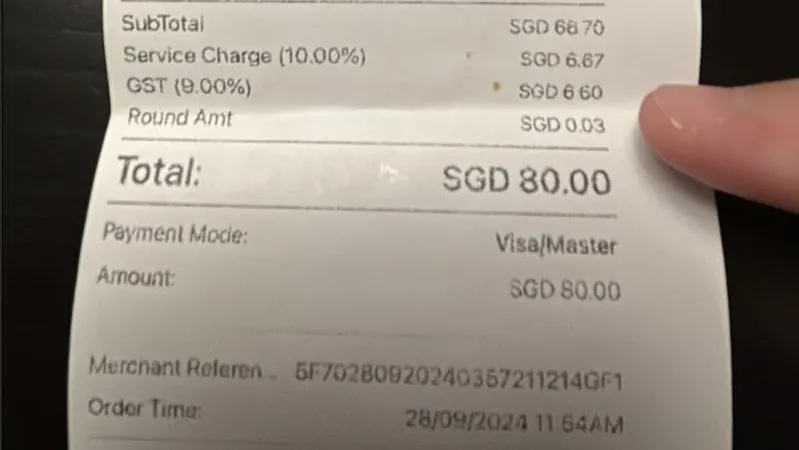
Outrage Over Restaurant Rounding Up Bills: Is It Fair Game?
2024-10-01
Introduction
In an eye-opening incident at a popular Singapore eatery, a diner has sparked a heated debate over the practice of rounding up bills.
The Incident
Gillian Chia, a guest at Chopstix & Rice in Suntec City Mall, expressed her frustration after noticing an unexpected extra charge on her credit card bill.
On September 28, Chia shared her experience on the Facebook page COMPLAINT SINGAPORE, stating, "It’s ridiculous for a restaurant to ROUND UP the bill. So I paid additional for no actual food or service but for rounding." She attached a photo of her receipt, which highlighted the charge of S$39.90 for a set meal for two, S$10.90 for ayam lemak, and S$15.90 for beef rendang. With the additional service charge of S$6.67 and a 9% GST of S$6.60, her total before rounding should have been S$79.97. Instead, she was billed S$80 due to a “Round Amount” fee of S$0.03.
Public Reaction
Critics quickly pointed out that because Chia paid using a credit card—where transactions can include cents—there should have been no rounding. One user on Facebook commented, "If (a customer) pays by card, it should be the exact amount." Another suggested that if there had to be rounding involved, it should have been down to S$79.95 instead of up to S$80.
Official Clarification
The Inland Revenue Authority of Singapore (IRAS) clarified that many businesses have adopted rounding practices due to the discontinuation of one-cent coins, commonly rounding bills to the nearest five cents to ease cash transactions. They noted that whether to round up or down is ultimately a decision left to each business.
Concerns Among Consumers
Commenters voiced concerns about potential profit from unfair rounding practices, with one asking, “How much is the restaurant really making for free?” They also shared observations from other countries where rounding is common, often directing the difference towards charitable causes or tips, highlighting a contrast in customer choice.
Criticism of Rounding Practices
Some Singaporeans have criticized rounding practices altogether. As noted in a 2016 letter to the ST Forum, “While the rounded-up figure may seem quite insignificant, it is wrong as a practice.”
Conclusion
As this discussion continues to unfold on social media, it raises intriguing questions about consumer rights and the ethical implications of rounding up bills. Is it simply a harmless practice, or does it reflect broader issues in customer service? The Independent Singapore has reached out to both Ms. Chia and Chopstix & Rice for further comments. Stay tuned as we uncover more about this trending topic!



 Brasil (PT)
Brasil (PT)
 Canada (EN)
Canada (EN)
 Chile (ES)
Chile (ES)
 España (ES)
España (ES)
 France (FR)
France (FR)
 Hong Kong (EN)
Hong Kong (EN)
 Italia (IT)
Italia (IT)
 日本 (JA)
日本 (JA)
 Magyarország (HU)
Magyarország (HU)
 Norge (NO)
Norge (NO)
 Polska (PL)
Polska (PL)
 Schweiz (DE)
Schweiz (DE)
 Singapore (EN)
Singapore (EN)
 Sverige (SV)
Sverige (SV)
 Suomi (FI)
Suomi (FI)
 Türkiye (TR)
Türkiye (TR)